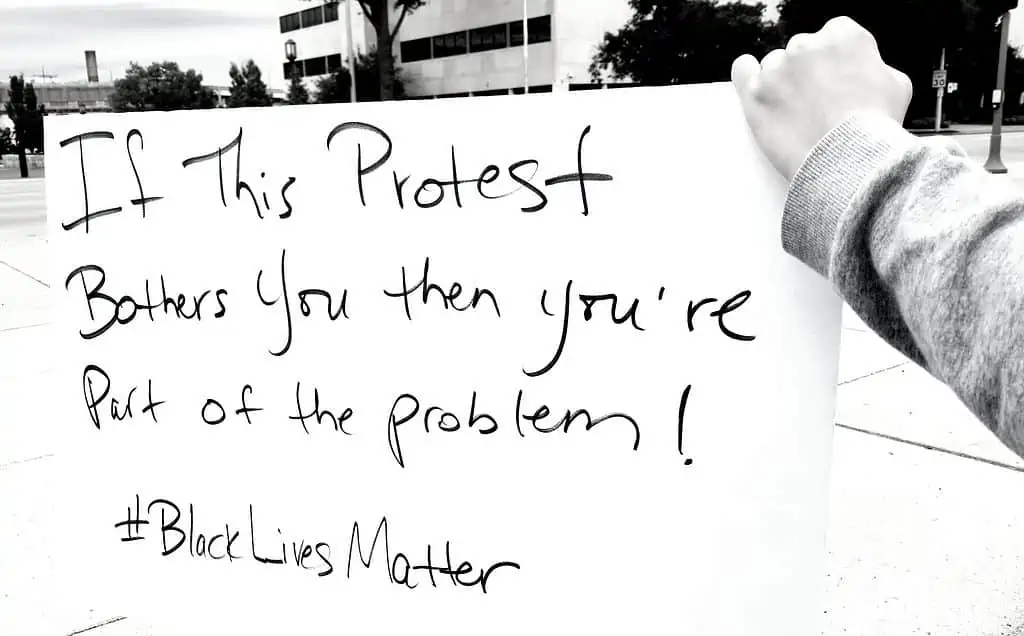
Disability Justice Solidarity in Fighting White Supremacy and State Violence
Disability Justice depends on a politic and practice of active solidarity and collective work for liberation. The Autistic Women and Nonbinary Network’s leadership, staff, volunteers, and community members share in the rage and sorrow caused by unceasing anti-Black racist violence in this nation, which directly impacts our Black leaders and community members. Many of us have joined those protesting across the United States these last several days, demanding an end to state violence in the form of policing.
We honor and lift the names of Tony McDade, Breonna Taylor, and James Scurlock, along with Ahmaud Arbery and George Floyd, among many others murdered just this past week alone and becoming ancestors far too soon. We honor the lives and legacies of the many Black women and trans people – and trans women – who so often face erasure in death just as in life. We honor the lives and freedom work of our many Black disabled elders and leaders on the front lines, fighting white supremacy and building community.
We grieve that state violence is so relentless and overwhelming that so many of our Black disabled community members have had no choice but to protest and riot in the midst of a global pandemic, because the state has left no other option. We understand the deep and intricate linkages between racism, white supremacy, and ableism. It is not possible for us to do disability advocacy work that does not address the horrific violence of racism in creating disability, exacerbating disability, and targeting disabled and negatively racialized people.
For our Black community members, we offer our love, our rage, and our solidarity. None of us are free until all of us are free. You are loved. You are valuable. You are needed. You are worth fighting for. Your lives matter.
And for our non-Black community members, let Martin Luther King Jr.’s words underscore the reasons for these riots – “A riot is the language of the unheard.” Let us also take heed of his words against the dangers of the white moderate’s reticence to support radical action – dangers that we know often arise among non-Black people of color’s refusal to work in solidarity as well.
For those wondering what to do, especially those who are disabled in ways that make participation in protests unsafe or impossible, we ask that you start at home. Check in with your Black friends, neighbors, and co-workers. Consider offering to do specific things that might make their load lighter – assist with meal preparation or delivery, send money, help with cleaning, make phone calls, or anything else that you might be able to do to support.
We know all too well the harm done to marginalized people that comes from exposure to horrific content on social media, even when meant to raise consciousness among those with the privilege not to know. AWN is intentional and thoughtful about what we post and share, and we ask our community members who are not Black to exercise similar caution and sensitivity when posting or sharing content about racist violence targeting Black people. Our Black community members do not need the added burden of encountering constant images and videos of Black people’s murders. Likewise, our Black community members need our support most now. We all have a responsibility to each other in our social media activism.
White community members – be careful not to post on social media in a way that centers your stress related to all the protests and injustices, and consider instead venting and processing behind the scenes with other white people. And while we recognize white people are also arrested and sometimes face state violence, and deserve our support when doing so in solidarity with our Black community members, we urge against dismissive comparisons and false equivalencies with the centuries of state violence and injustice targeting Black people culminating in this moment.
Allyship is hard work, and requires constant practice. White and non-Black people of color working to practice allyship will often get it wrong. But we must not focus on the difficulties and struggles of allyship when Black community members are suffering and dying. Our most important charge is, as Assata Shakur implored us, to love and protect one another. Let us love and protect our Black community members by working to minimize the harm each of us is capable of doing, while working to end the systems of state violence and oppression that enable and further anti-Black racism.
As a grassroots organization led by and for disabled people, we also understand that activism, advocacy, organizing, and protest take many forms, not always visible or praised. Many of us are at home in public demonstrations and protests. Others are at their best in doing jail support, providing child care, working as street medics, facilitating communications, preparing meals, raising money, or amplifying and signal boosting online. We each can strive to be the kind of self-advocate or activist that works for our own strengths, abilities, and capacities. And we must also take care to attend to our own mental health when we bear witness to constant injustice, whether we are directly targeted or working in allyship. Disability Justice organizers have always been at the forefront of honoring multiple strategies, tactics, and modes of participation, and we embrace this wisdom in our own work.
We know that ableism will not end until and unless white supremacy also ends. AWN is fighting for a world in which racism and ableism no longer exist, and in which our Black disabled community members can live and love freely and fully.
